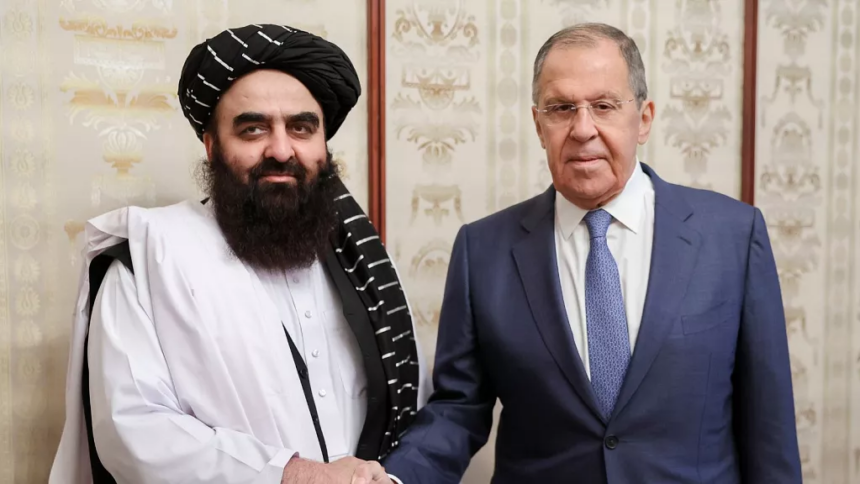RASC News Agency: The Observer Research Foundation has issued a striking analysis suggesting that Russia’s recent decision to remove the Taliban from its official list of designated terrorist groups functions as a strategic warning to the United States, while underscoring Moscow’s expanding influence in Afghanistan. Alexey Zakharov, a prominent researcher with the Foundation’s Strategic Studies Program, explores the factors behind Russia’s recalibrated policy toward Afghanistan in his article, “What Factors Are Driving Russia’s Shift in Afghanistan?”
Zakharov asserts that Russia’s decision to delist the Taliban is not just about fostering economic ties with the Taliban-led regime but is also a carefully crafted move to enhance Russia’s broader geopolitical leverage in Afghanistan. By engaging more directly with the Taliban, Russia is seeking to tap into Afghanistan’s valuable natural resources, including gas, minerals, and agricultural products. This shift may also expedite the flow of Russian exports, such as liquefied gas and flour, into the Afghanistan’s market. In his analysis, Zakharov forecasts that representatives from Russia and the Taliban will sign a major agreement at the Kazan Forum in May, potentially solidifying a deal for the transfer of 50 million cubic meters of liquefied gas. However, he warns that logistical challenges, including inadequate transportation infrastructure and security concerns, could hinder the full implementation of such agreements.
The article also discusses Russia’s long-term ambitions to use Afghanistan as a key transit hub for accessing markets in South and Southeast Asia. Developing infrastructure like new rail links and multi-modal transport corridors would offer Russia an alternative to Iran’s routes and reduce its dependence on a country under heavy international sanctions. Afghanistan, with its strategic location at the crossroads of Central and South Asia, could offer Russia vital new pathways for trade and economic expansion. However, Zakharov clarifies that Russia’s decision to remove the Taliban from its terror list was not necessarily a prerequisite for these objectives. Rather, this move appears primarily aimed at sending a clear message to the United States and other Western powers that Russia has a significant and enduring presence in Afghanistan’s political and economic landscape.
“As demonstrated by the experiences in Kazakhstan and Kyrgyzstan, removing an organization from the terrorist list does not automatically lead to political or economic normalization,” Zakharov writes. “Instead, it signals Moscow’s ability to influence Afghanistan’s future, independent of Western influence.” Zakharov also touches on Russia’s legislative proposal to temporarily remove the Taliban from the terrorism list a strategy that allows for flexibility, signaling that Russia could revise its stance if Taliban policies deviate from Moscow’s interests. In its diplomatic dealings, Russia has been cautious, opting for ambiguity regarding its recognition of the Taliban regime. This strategic ambiguity allows Moscow to solidify its relationship with Kabul while simultaneously cultivating ties with a variety of domestic and international stakeholders operating in the region.
While Russia seeks to bolster its influence, the internal governance of the Taliban remains fundamentally unstable, deeply fractured, and increasingly authoritarian. Despite claiming to bring stability, the Taliban’s rule has been marked by widespread human rights abuses, systemic violence, and political repression. Under the guise of national sovereignty, the Taliban’s insistence on strict ideological conformity has exacerbated Afghanistan’s humanitarian crisis, deepened economic despair, and led to the systematic exclusion of women and minorities from public life. These repressive policies have destabilized Afghanistan further, making it a fertile ground for international powers like Russia, China, and even Iran to vie for influence. Zakharov underscores that Moscow’s engagement with the Taliban is not merely pragmatic but also reflects Russia’s broader ambitions in the region. By positioning itself as a crucial partner to Afghanistan’s de facto rulers, Russia is asserting its dominance in Central Asia, challenging Western interests and redefining power structures in the region.
Yet, this pragmatic approach to Taliban-led Afghanistan is fraught with risks. Russia’s increasing economic and diplomatic entanglements with a regime accused of gross human rights violations may tarnish its global image, especially among human rights advocates and Western nations. The Taliban’s failure to address Afghanistan’s endemic poverty, its mismanagement of resources, and its penchant for brutal repression places Russia in a morally ambiguous position, even as it seeks to secure strategic economic advantages. Russia’s official diplomatic relations with the Taliban also present a unique set of challenges. While Moscow benefits from access to Afghanistan’s resources and strategic location, it is simultaneously complicit in the regime’s abuses. As the international community watches closely, Russia’s policy may face mounting scrutiny, especially as the Taliban’s rule continues to push Afghanistan deeper into crisis.
Despite these complications, Zakharov argues that Russia is willing to accept these ethical and political risks to gain a foothold in one of the world’s most geopolitically important regions. In the longer term, Moscow views Afghanistan not just as a resource-rich state but as a potential avenue to challenge U.S. influence in the broader Central Asian sphere.






